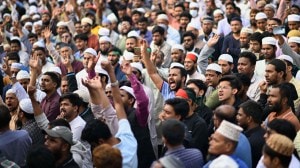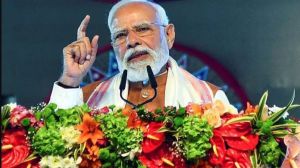Santosh Singh and Aditya Anmol’s Jannayak traces the life and times of Karpoori Thakur, the socialist leader
Like BR Ambedkar, Thakur has been impacting social justice goals more after his death than was acknowledged in his lifetime
 Singh and Anmol’s deeply researched book analyses the history of this struggle in an accessible manner through its key figure, Thakur. (Source: Amazon)
Singh and Anmol’s deeply researched book analyses the history of this struggle in an accessible manner through its key figure, Thakur. (Source: Amazon)2024 happens to be Karpoori Thakur’s centennial. While it was long overdue, he was posthumously conferred the country’s highest civilian honour, Bharat Ratna, earlier this year. In his almost four-decade-long political career, where he won nearly every assembly and parliament election except in 1984, Thakur led Bihar as an education minister once and twice as chief minister, and set the egalitarian vision of social and economic justice in concrete terms.
The aftereffects of his politics remain more relevant today than they were during his lifetime. As a result, even political parties with ideologies opposed to his politics refer to his legacy.
Like Ambedkar, Thakur has been impacting the concerns of social justice goals more after his death than was acknowledged in his lifetime. While writing this review, I also have the biography of George Fernandes by Rahul Ramagundam on my desk and both these books provide detailed and rich accounts of the life and times of people of India through the years they lived in. Hence, I would consider The Jananayak Karpoori Thakur: The Voice of the Voiceless (Rs 599, Penguin) by Santosh Singh and Aditya Anmol as the biography of all those years as well.
Born in circumstances rife with poverty and discrimination in Pitaunjhia, Samastipur, Thakur developed a radical consciousness and a firm political will through participation in peasants’ movements for cultivation rights and land redistribution as well as the freedom movement. He was arguably one of the most doughty, popular, and accessible socialist leaders of his generation. Affectionately called Jananayak, or people’s leader, Thakur introduced major reforms in several sectors, including free education up to high school.
But his enduring legacy is of mainstreaming the concept and political demand for intersectional and proportional access to opportunity. According to the book, he often used to tell his peers that “there are three kinds of pains — an upper caste can be poor but still has his honour intact, an OBC may be monetarily well-off but does not get respect and the Scheduled Caste suffers from both kinds of pains”. This is the kind of insight that makes Thakur a brilliant thinker, agitator, and administrator in equal measure.
Appointed by the Bihar government In 1970, the Mungeri Lal Commission identified and listed 128 ‘backward communities’ in the state in its 1976 report. Ninety four of these ‘backward communities’ were further marked as ‘most backward’. Based on the recommendations of the report, Thakur’s government provided 26 per cent reservation in 1978 of which a 12 per cent share was carved out for the OBCs, 8 per cent for the economically backward classes among the OBCs, 3 per cent for women, and 3 per cent for the poor from ‘upper caste’ communities.
The move proved costly for Thakur in the face of widespread resentment and opposition from the privileged castes and classes. Though his government fell shortly thereafter, he had sowed the seeds for a reckoning of backwardness in all its forms. The Karpoori Thakur formula, as it popularly came to be known as, is widely recognised as a precursor of the Mandal Commission report implemented in the 1990s, that recommended 27 per cent reservations for OBCs.
2024 also happens to be the year when another prominent political leader, Lal Krishna Advani, was conferred with the Bharat Ratna. While political-minded readers may readily recall the fraught Mandal-Kamandal political context that shored up the fortunes of the Bharatiya Janata Party (BJP), it bears highlighting once again here. Advani’s infamous rath yatra was a reactionary response to the revolutionary implementation of the Mandal Commission report.
Its sole purpose was to stymie the rising consciousness of deep social inequality among the historically oppressed and marginalised people and the socialist ferment that shaped it into a political programme to pave way for opportunity, participation, representation, and equality. The rath yatra was, simply put, an embodiment of the deep anxiety, as well as an assertion of social hierarchy, by those who loathe to yield their power and privilege to the demands of democracy.
There could be no two political leaders as different from each other as Thakur and Advani. Though many tried to mistakenly frame the choice of the two Bharat Ratnas as a masterstroke, it is difficult to reconcile the two, given the history as well as the ongoing struggles for social and economic justice.
As the authors remind us, the Jana Sangh constituents of the Janata Party, alarmed by Thakur’s empowering agenda, engineered the downfall of the socialist leader’s government swiftly in 1979. Even today, the Sangh and the BJP are opposed to the long-standing caste census demand that is essential to update policies for social and economic justice.
Even as the Bharat Ratna announcements came on the heels of the news of the pran pratishtha of the Ram temple in Ayodhya, it is worth remembering that it was in Thakur’s constituency Samastipur (then Tajpur) that Lalu Prasad, a socialist cut from the same cloth as his political guru Thakur, that Advani was detained during his rath yatra to maintain law and order in the state in 1990.
Another socialist of yet another generation recently dealt a significant electoral blow to the BJP in Ayodhya in the recently concluded Lok Sabha elections. These are no mere coincidences. It is a struggle that continues from the days of the anti-colonial struggle between those who participated in it for national liberation and social and economic justice and those who did not participate as they wanted to preserve their place in the oppressive social and economic order. It is a struggle between political movements that preferred the status quo in the post-Independence era and those who wanted change.
Singh and Anmol’s deeply researched book analyses the history of this struggle in an accessible manner through its key figure, Thakur. His legacy, or, as the authors beautifully put it — “the trail of camphor”, continues to enliven social justice, secularism, and inclusive development even today.
A seasoned journalist and a master’s in public policy holder writing a book together can only be a good thing. Singh and Anmol draw on archives, academic sources, interviews, and other public and private sources to put together a compelling, powerful, and often endearing portrait of Thakur. The private and public, the personal and the political are delicately balanced. If forced to nitpick, as an academic, I would say that some light editing with regards to consistency in referencing and either thematic or chronological organisation of ideas and narratives would improve the book’s readability.
Professor Manoj Kumar Jha is MP, Rajya Sabha, from Rashtriya Janata Dal
- 01
- 02
- 03
- 04
- 05































